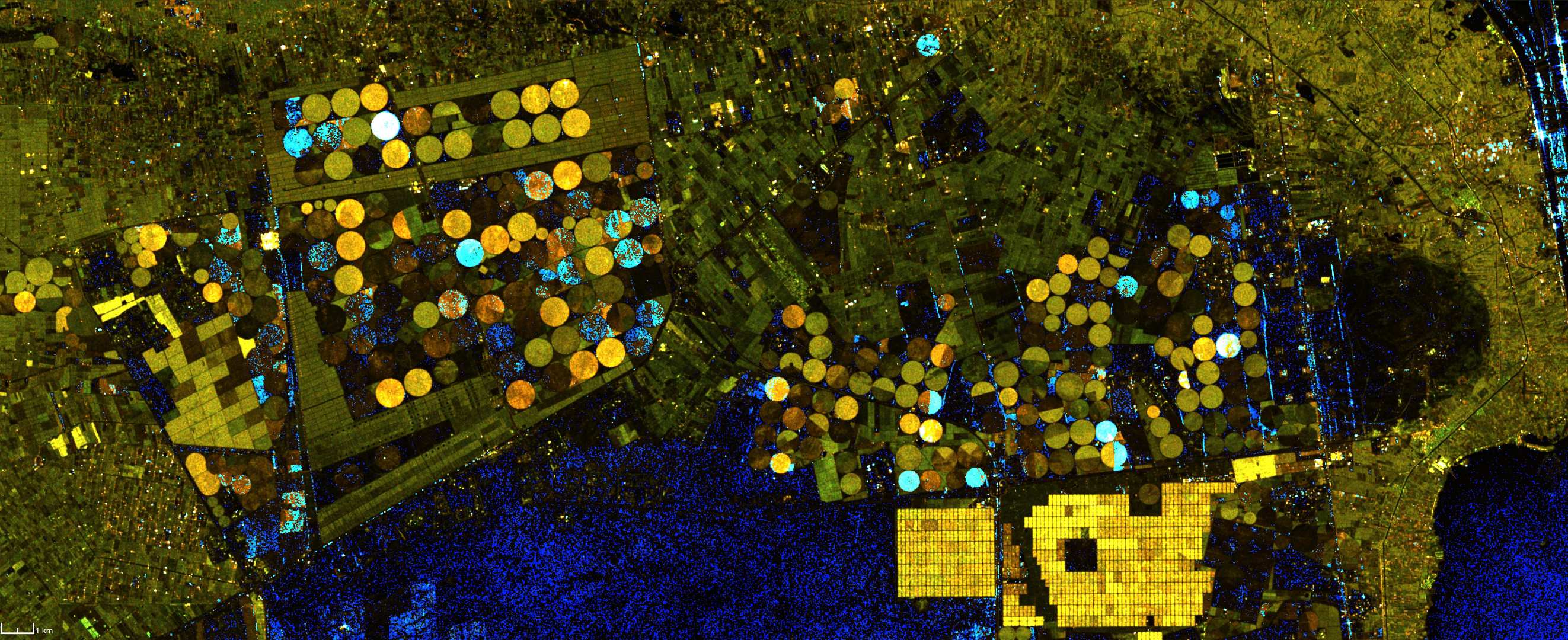EO AFRICA R&D Facility Online Course
PolInSAR Processing and Applications

Agriculture fields close to Al Ismailiya in Egypt using Sentinel-1 IW Monthly mosaics provided by Copernicus Data Space Ecosystem
Introduction to the course
This online course equips participants with a fundamental knowledge of PolInSAR processing and application concepts. During the course participants will refresh their knowledge of principles and properties of SAR remote sensing and SAR images interpretation. The goal of the online course is to Participants of this training module will have a chance to become familiar with radar polarimetry and interferometry to then apply this knowledge into PolInSAR concept that is a combination of the two techniques. This course will provide an overview of the advantages and limitations of basic applications of PolInSAR data related to particularly to agriculture and food security, with a particular focus on the African region. Additionally, it will give an overview of selected current sensors developed by ESA and ESA EO Third Party Missions as well as other and future missions providing PolInSAR data. The main characteristics and access to this data will also be provided.
The curriculum combines theoretical lectures with practical assignments related to data processing for specific use cases. Participants engage with a variety of resources, including short videos, webinars, presentations, reading materials, and reference articles. Mandatory quizzes based on the lectures ensure successful completion of the training, and the issuance of a certificate provided by EO AFRICA R&D Facility.
Upon completion of this online training course, the participant will be able to:
- Understand theoretical principles of PolInSAR data, selected processing algorithms data products and their use in various applications, considering their advantages and limitations.
- Compare differences between SAR Polarimetry, SAR Interferometry, and Polarimetric SAR Interferometry (PolInSAR).
- Understand and explore available tools and methods for the exploitation of dual-pol and full-pol data.
- Understand the role and purpose of the current and future ESA and ESA Third Party Missions providing SAR and PolInSAR data to users and their applicability in the African region.
- Practice exploitation and access of publicly available datasets providing fully-polarimetric and dual-pol images through small practical assignments.
Mode of Delivery
The course consists of videos, PowerPoints, quizzes, and practical exercises, supplemented by reading material and reference materials. All materials will be offered through the Moodle Cloud learning platform. Participants are expected to digest the training materials independently (i.e., no live teaching is foreseen). Interaction with the teaching staff will be possible through a series of dedicated live feedback sessions (hosted through MS Teams) and a Q&A forum.
Prerequisites
The participants are expected to have a basic knowledge on Earth Observation, Python programming and the use of cloud environments for EO image processing. This course will provide more advanced concepts of processing and utilizing fully-polarimetric spaceborne datasets, therefore we do expect participants with familiarity in SAR and SAR data processing. Before the start of the course participants will be given access to first two online courses of the EOAFRICA RDF series (Cloud Computing and algorithms for EO analyses; Principles of and advances in Earth Observation), which we advise to follow for refreshing the knowledge on basic principles of EO and tools/algorithms. Although having participated in those courses is certainly an advantage, candidates are not expected to have attended this course, unless they can demonstrate their familiarity with the topics.
Selection
The course will be offered to a maximum of 75 participants. Selection will be based on relevant academic background and employment. Only applicants working for an African-based organization are eligible. We will strive to have a gender-balanced and country-balanced group of participants. Preference is given to candidates working as (Ph.D.-) researchers, post-doc, and university staff. Selection will be made two weeks before the course starts. Participants are expected to notify their employer or institution about commitment to this online course.
Timeline:
Total Course duration will be 40 hours. (estimated 10 hours per week for 4 weeks)
Additionally, five live sessions (60 min each) with teachers will be organised on:
- Monday, May 26, 10:00 AM (CEST) – Live introduction to the course
- Monday, May 31, 14:00 AM (CEST) – Q&A session: Week 1
- Monday, June 6, 14:00 AM (CEST) – Q&A session: Week 2
- Monday, June 13, 14:00 AM (CEST) – Q&A session: Week 3
- Friday, June 20, 14:00 AM (CEST) – Q&A session: Week 4
- (All CEST-times which is UTC+2)
Certificate
You will receive a certificate of completion upon completing the End of Exercise Assignment.

